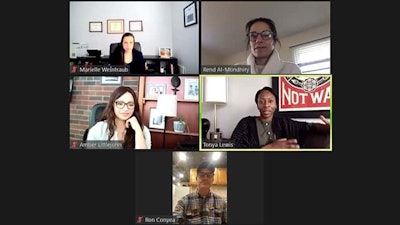
In working with the U.S. Hemp Roundtable (USHR) to form its Minority Empowerment Committee, Amber Littlejohn said she and USHR realized that minority hemp entrepreneurs and small businesses face many of the same challenges.
“The lack of access to foundational knowledge is far too common and often provides a truly insurmountable barrier,” said Littlejohn, executive director of the Minority Cannabis Business Association (MCBA).
To that end, the Minority Empowerment Committee and MCBA hosted the Dec. 8 webinar, “Cultivating Entrepreneurship in the Hemp Industry.”
Littlejohn moderated the four-guest panel discussion with a grower, processor, doctor and attorney about what small and minority-owned hemp business leadership should know and consider. The following is a recap of the webinar discussion broken into three parts.
1. Differentiating Your Company and Product
“Both small growers and manufacturers have shared stories about trouble finding buyers and breaking into the supply chain,” Littlejohn said. She asked the panelists why they think it is difficult for small businesses to enter the supply chain and how they can compete.
Dr. Marielle Weintraub, Ph.D., a director of scientific research and development at cannabidiol (CBD) company Zilis and founding board member and current president of the U.S. Hemp Authority, has a background in behavioral neuroscience.
Weintraub discussed how brands and distributors can differentiate themselves. The barriers to start a CBD brand specifically are low, so there is a proliferation of such brands. “I think there are so many products coming in that are identical to the product next to it on the shelf,” she said. “And I think people are going to start getting bored of that.
“Those companies are going to start to kind of wane out, and the ones that are going to win are the ones who really, intentionally find technology or niches or very specialist products that people want—that people need—and to really differentiate themselves inside what really is a large market at this point.”
2. Obtaining Startup Capital and Resources
Capital—for expenses such as seed, land, labor, equipment and marketing—is one of the largest barriers to entry, said Tonya Lewis, co-founder and chief marketing officer at Nashville, Tenn., hemp processor NuSachi.
“Without having a well-capitalized, well-funded business, it's a little bit difficult to break into the industry in a way that allows you to really build your livelihood around it, in general,” Lewis said. “Well-capitalized farms and well-capitalized processors are the ones that are really getting a lot of the larger contracts.”
Kentucky hemp farmer Ron Conyea, a board member of the U.S. Hemp Authority and a member of the U.S. Hemp Growers Association, said growers have struggled over the past several years with breaking into the industry and selling their product. But as capital continues to grow, he said, processors will seek out farmers to grow for them, “… and they'll seek out the smaller ones who want to do a great job.”
Littlejohn asked the speakers if they could offer advice for obtaining startup capital and resources.
Rend Al-Mondhiry, partner at law firm Amin Talati Wasserman, works with clients in the dietary supplement, over-the-counter medicine, food and cosmetics industries. Al-Mondhiry said that when investors visit the firm, they often seek assurance that they aren’t “taking on unnecessary risk.”
(Retailers are also beginning to become more concerned about CBD and hemp compliance. “Retailers and investors alike want to see the company understands the laws and regulations that apply to the product category that they’re selling,” Al-Mondhiry said.)
When searching for capital, business owners need a well-developed plan, as well as the fortitude to deal with “the bumps and bruises” that come along with entering a new industry, Lewis said.
“If you’re going to approach investors, you want to make sure that you have your who, what, when, where and how you're going to approach the market,” she said. “What’s your market segment? How do you plan to generate revenue … ? How do you set yourself apart? How do you maintain quality standards?
“Investors want to know you're in it for the long haul, that you’re committed,” Lewis said.
With other crops such as corn (listed on the Chicago Board of Trade), the market agrees on a set price, Conyea said. That’s not the case with hemp, so growers need to “start small” and reach an agreement with a buyer before they’ve grown more than they can sell.
“You don't want to get stuck with a lot of hemp that's sitting around in your shop or your farm and nowhere to go with it, and then it's time to pay off your operating note or whatever and you just get in a bind,” he said.
3. Complying with Regulations
Many people don’t view regulations as particularly exciting, said Littlejohn, a policy attorney who previously worked at the American Herbal Products Association and the Natural Products Association.
“But I will tell you in my experience representing organizations that represent small businesses that the regulatory side can become a really gigantic and insurmountable barrier to entry, and even sustainability,” she said. “I've seen single enforcement actions and just garden-variety enforcement actions run companies over a quarter of a million dollars and really cripple, if not completely shutter, the doors of these companies.”
Littlejohn asked the panelists about the most common issues regulators look for and which regulatory issues hemp businesses are experiencing.
In its processing operations, NuSachi ensures that no products with more than 0.3% tetrahydrocannabinol (THC) leave the facilities and that all product labels follow state regulatory guidelines, Lewis said. Processors need to keep records, including certificates of analysis (COAs) and standard operating procedures (SOPs). She added that companies must be registered with their state.
Weintraub noted that the U.S. Food and Drug administration (FDA) and the Federal Trade Commission (FTC) issue warning letters to businesses that violate rules and regulations and advised the webinar audience to look at those letters to better understand possible risks.
“Most of the time, if the FDA right now [is] coming after you, or the FTC is coming after you, you probably made a claim or something’s labeled wrong on your product,” Weintraub said.
In addition, Al-Mondhiry provided a breakdown of which agencies govern which aspects of hemp and cannabinoid rules and regulations.
- The United States Department of Agriculture (USDA) “is … generally responsible for regulating hemp growth and the plant itself,” she said.
- State regulators often regulate processing operations, depending on what is done with the hemp extract, Al-Mondhiry said.
- The FDA “is generally responsible for … the ingredients, the product formulation, and just as importantly how it's manufactured and ensuring that you're making a safe, quality product,” she said.
- The FTC “is responsible for ensuring that claims are truthful, accurate and supported by appropriate evidence,” Al-Mondhiry said.
“Some of the trade associations have so many great, free resources to help you understand how various products are regulated because there are different rules for different products,” Al-Mondhiry said. “Mandatory good manufacturing processes for food and supplements … are slightly different; the claims that can be made for cosmetics are very different than the claims that can be made for supplements.”
As numerous questions and comments continued to pop up on participants’ screens and the hour-long webinar came to a close, Littlejohn said MCBA and USHR plan to host more events to continue to engage business owners.


























